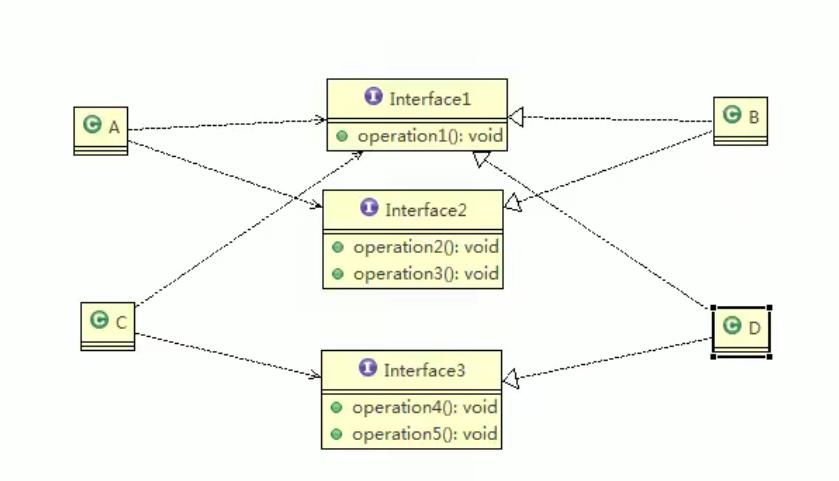23种设计模式之接口隔离原则
Posted 暴躁的程序猿啊
tags:
篇首语:本文由小常识网(cha138.com)小编为大家整理,主要介绍了23种设计模式之接口隔离原则相关的知识,希望对你有一定的参考价值。
接口隔离原则(Interface Segregation Principle)
基本介绍:
1.客户端不应该依赖它不需要的接口,即一个类对另一个类的依赖应该建立在最小的接口上。

虚线空心三角号 实现
虚线箭头 依赖
我们可以这里 类B实现了接口的全部方法 类D实现了接口的全部方法
但是类A只使用类B的一二三方法
类B只使用类D的一四五方法
我们按照当前类图情况编写出来代码
/**
* 定义一个接口 有五个方法
*/
interface Interface1 {
void operation1();
void operation2();
void operation3();
void operation4();
void operation5();
}
class B implements Interface1 {
@Override
public void operation1() {
System.out.println("B 实现了operation1");
}
@Override
public void operation2() {
System.out.println("B 实现了operation2");
}
@Override
public void operation3() {
System.out.println("B 实现了operation3");
}
@Override
public void operation4() {
System.out.println("B 实现了operation4");
}
@Override
public void operation5() {
System.out.println("B 实现了operation5");
}
}
/**
* D类实现了 Interface1
*/
class D implements Interface1 {
@Override
public void operation1() {
System.out.println("D 实现了operation1");
}
@Override
public void operation2() {
System.out.println("D 实现了operation2");
}
@Override
public void operation3() {
System.out.println("D 实现了operation3");
}
@Override
public void operation4() {
System.out.println("D 实现了operation4");
}
@Override
public void operation5() {
System.out.println("D 实现了operation5");
}
}
/**
* A类通过接口interface1 依赖(使用)B类,但是只会用到1,2,3方法
*/
class A {
public void depend1(Interface1 interface1){
interface1.operation1();
}
public void depend2(Interface1 interface1){
interface1.operation2();
}
public void depend3(Interface1 interface1){
interface1.operation3();
}
}
/**
* C类通过依赖(使用)D类,但是只会用到1,4,5方法
*/
class C {
public void depend1(Interface1 interface1){
interface1.operation1();
}
public void depend4(Interface1 interface1){
interface1.operation4();
}
public void depend5(Interface1 interface1){
interface1.operation5();
}
}
我们可以发现 不是每个方法都被使用 我们实现那么多方法没有用到
这里按照我们的接口隔离原则 应该把接口拆分成几个独立的接口 类A和类C分别与它们需要的接口建立依赖关系,也就是采用接口隔离原则。
接口中出现的方法,根据实际情况拆分成三个接口
拆分后的类图

拆分后的代码
/**
* @create: 2021/9/25
* @author: Tony Stark
*/
public class Segregation1 {
public static void main(String[] args) {
A a = new A();
//a通过接口依赖B类
a.depend1(new B());
a.depend2(new B());
a.depend2(new B());
C c = new C();
//c类通过接口依赖D类
c.depend1(new D());
c.depend4(new D());
c.depend5(new D());
}
}
/**
* 接口1
*/
interface Interface1 {
void operation1();
}
/**
* 接口2
*/
interface Interface2{
void operation2();
void operation3();
}
/**
* 接口3
*/
interface Interface3{
void operation4();
void operation5();
}
class B implements Interface1,Interface2 {
@Override
public void operation1() {
System.out.println("B 实现了operation1");
}
@Override
public void operation2() {
System.out.println("B 实现了operation2");
}
@Override
public void operation3() {
System.out.println("B 实现了operation3");
}
}
/**
* D类实现了 Interface1
*/
class D implements Interface1,Interface3 {
@Override
public void operation1() {
System.out.println("D 实现了operation1");
}
@Override
public void operation4() {
System.out.println("D 实现了operation4");
}
@Override
public void operation5() {
System.out.println("D 实现了operation5");
}
}
/**
* A类通过接口interface1 依赖(使用)B类,但是只会用到1,2,3方法
*/
class A {
public void depend1(Interface1 interface1){
interface1.operation1();
}
public void depend2(Interface2 interface2){
interface2.operation2();
}
public void depend3(Interface2 interface2){
interface2.operation3();
}
}
/**
* C类通过依赖(使用)D类,但是只会用到1,4,5方法
*/
class C {
public void depend1(Interface1 interface1){
interface1.operation1();
}
public void depend4(Interface3 interface3){
interface3.operation4();
}
public void depend5(Interface3 interface3){
interface3.operation5();
}
}
输出
B 实现了operation1
B 实现了operation2
B 实现了operation2
D 实现了operation1
D 实现了operation4
D 实现了operation5
本文学习借鉴了尚硅谷老师的视频
此处
以上是关于23种设计模式之接口隔离原则的主要内容,如果未能解决你的问题,请参考以下文章